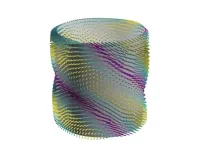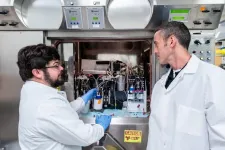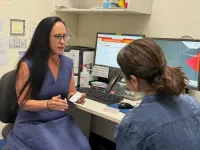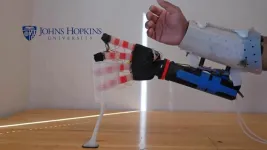(Press-News.org) A common type of diabetes medication could help cancer patients make a better long-term recovery, according to new research from the University of East Anglia.
Many cancer patients go on to develop heart failure - because of the cancer itself and also due to chemotherapy. This can lead to a reduced quality of life, multiple admissions to hospital or even death.
But a new study published today shows that a type of diabetes medication, called an SGLT2 inhibitor, may help protect the heart during and after cancer treatment.
This is the first time that any medication has been shown to be beneficial in reducing heart failure or heart failure hospitalisation in cancer patients and survivors.
The medication appears to lower the risk of heart failure and unplanned hospital visits related to heart failure by more than 50 per cent.
And the benefits were found to be particularly promising for breast cancer patients receiving a common chemotherapy type called anthracycline chemotherapy, which can affect heart health.
Lead researcher Prof Vassilios Vassiliou, from UEA’s Norwich Medical School and Consultant Cardiologist at the Norfolk and Norwich University Hospital, said: “Cancer is currently one of the leading causes of premature death worldwide.
“Chemotherapy has played an instrumental role in improving patient outcomes. But up to 20 per cent of cancer patients who have had chemotherapy go on to develop heart problems, with up to 10 per cent having heart failure.
“We know that a type of diabetes medication called SGLT2 inhibitors are recognised for their cardiovascular benefits. They can improve the symptoms of heart failure such as breathlessness and tiredness, and also reduce people’s risk of becoming frail.
“We wanted to see whether SGLT2 inhibitors could help protect the heart during and after cancer treatment.”
Analysing 13 studies with a total of 88,273 cancer patients and survivors, the team found that hospital admissions for heart failure were reduced by half.
The effect was especially striking in breast cancer patients undergoing anthracycline chemotherapy, offering a promising breakthrough in patient care
The number of new heart failure cases appeared to fall by more than two-thirds (71 per cent), suggesting these pills might help protect the heart during and after cancer treatment, though the research team say that more research is needed to confirm these findings.
Prof Vassiliou said: “What we found is that SGLT2 inhibitors may help protect the heart during and after cancer treatment.
“These medications significantly lowered the risk of heart failure and reduced hospital visits related to heart failure.
“The benefits are particularly promising for breast cancer patients receiving a common type of chemotherapy called anthracycline chemotherapy,” he added.
“We hope that this type of medication could in future be used as routine for cancer patients.”
This research was led by the University of East Anglia, in collaboration with the Norfolk and Norwich University Hospital, Ninewells Hospital and Medical School in Dundee, IRCCS Policlinico San Donato (Italy), La Paz University Hospital (Spain), Quiron Pozuelo University Hospital (Spain) and the University of Milan (Italy).
‘Impact of Sodium-Glucose Cotransporter-2 Inhibitors on Heart Failure Outcomes in Cancer Patients and Survivors: A Systematic Review and Meta-Analysis' is published in the European Journal of Preventive Cardiology.
ENDS
END
Diabetes drug could help cancer patients make better recovery
Peer reviewed - systematic review and meta analysis - humans
2025-03-06
ELSE PRESS RELEASES FROM THIS DATE:
Seismic study of Singapore could guide urban construction and renewable energy development
2025-03-05
A new seismic study of Singapore could guide urban growth and renewable energy development in the coastal city nation, where 5.6 million residents live within an area of 734 square kilometers.
The study, published in Seismological Research Letters, identifies areas with increased risk of ground shaking and a possible reservoir for geothermal energy production, as well as a glimpse at Singapore’s tectonic history.
Jiayuan Yao of China University for Geosciences and colleagues analyzed teleseismic data captured by a few permanent seismic stations and a nodal seismic array deployed in 2019 around the city. Their results provide the first detailed look at the top-kilometer ...
Tufts scientists develop open-source software for modeling soft materials
2025-03-05
When mechanical and structural engineers design machines, bridges, and buildings, they calculate loads, stresses, and deformation of metal, steel, concrete, glass, wood, and plastic to find the optimal geometry that bears loads with the minimum cost of material.
Designing for relatively hard materials that do not deform too much is commonly handled by software that calculates and optimizes structures using mathematical models that are well understood and easily applied.
But there is an expanding class of design challenges for things that incorporate soft materials—biological materials, engineered tissues, membranes, and even shape-shifting ...
Repurposed ALS drug becomes imaging probe to help diagnose neurodegeneration
2025-03-05
Positron emission tomography (PET) is a nuclear imaging technique used to diagnose conditions such as cancer. An innovative advance from scientists at St. Jude Children’s Research Hospital is enhancing the technique’s ability to check for signs of neurological disease. The researchers repurposed the drug edaravone, an antioxidant used to treat amyotrophic lateral sclerosis (ALS), as a probe to be used with central nervous system PET imaging. With this technique, the researchers can ...
AI can open up beds in the ICU
2025-03-05
At the height of the COVID-19 pandemic, hospitals frequently ran short of beds in intensive care units. But even earlier, ICUs faced challenges in keeping beds available. With an aging American population, 11% of hospital stays included ICU stays.
Artificial intelligence offers a possible solution, says Indranil Bardhan, professor of information, risk, and operations management and Charles and Elizabeth Prothro Regents Chair in Health Care Management at Texas McCombs. AI models can predict the lengths of time patients will spend in the ICU, helping hospitals better manage their beds and, ideally, cut costs.
But although AI is good at predicting length of stay, ...
Are robotic hernia repairs still in the “learning curve” phase?
2025-03-05
For an abdominal wall hernia repair, also known as a ventral hernia repair, the most common surgical approaches have been laparoscopic and open techniques.
But a new approach for repairing hernias has been steadily growing in popularity: the surgical robot.
Supporters of using the robot method state multiple advantages over traditional laparoscopic and open approaches, including improved surgeon ergonomics.
But there may be downsides to the technology that are going undiscussed.
In a research article published in JAMA Surgery, Brian Fry, M.D., M.S., a ...
New STI impacts 1 in 3 women: Landmark study reveals men are the missing link
2025-03-05
A landmark study reveals that bacterial vaginosis (BV), a condition affecting nearly a third of women worldwide and causing infertility, premature births and newborn deaths, is in fact a sexually transmitted infection (STI), paving the way for a revolution in how it is treated.
Monash University and Alfred Health researchers at the Melbourne Sexual Health Centre say their findings, published today in the New England Journal of Medicine, hold the key to driving down stubborn and distressing recurrence ...
Feeling is believing: Bionic hand “knows” what it’s touching, grasps like a human
2025-03-05
Johns Hopkins University engineers have developed a pioneering prosthetic hand that can grip plush toys, water bottles, and other everyday objects like a human, carefully conforming and adjusting its grasp to avoid damaging or mishandling whatever it holds.
The system’s hybrid design is a first for robotic hands, which have typically been too rigid or too soft to replicate a human’s touch when handling objects of varying textures and materials. The innovation offers a promising solution for people with hand loss and could improve how robotic arms interact with their environment.
Details about the device appear today in Science Advances.
“The ...
Damon Runyon Cancer Research Foundation awards $4.4 million to top young scientists
2025-03-05
The Damon Runyon Cancer Research Foundation has named 13 new Damon Runyon Fellows, exceptional postdoctoral scientists conducting basic and translational cancer research in the laboratories of leading senior investigators. The prestigious, four-year Fellowship encourages the nation's most promising young scientists to pursue careers in cancer research by providing them with independent funding ($300,000 total) to investigate cancer causes, mechanisms, therapies, and prevention.
The Foundation has also named ...
Over-the-counter pain relievers linked to improved recovery from concussion
2025-03-05
EMBARGOED FOR RELEASE UNTIL 4 P.M. ET, WEDNESDAY, MARCH 5, 2025
Media Contacts:
Renee Tessman, rtessman@aan.com, (612) 928-6137
Natalie Conrad, nconrad@aan.com, (612) 928-6164
Over-the-counter pain relievers linked to improved recovery from concussion
MINNEAPOLIS – People who take over-the-counter pain relievers after a concussion may recover faster than those who do not take pain relievers, according to a preliminary study released today, March 5, 2025, that will be presented at the American Academy of Neurology’s 77th Annual Meeting taking place April 5–9, 2025, in San Diego ...
Stressed out? It may increase the risk of stroke
2025-03-05
MINNEAPOLIS — Some people living with chronic stress have a higher risk of stroke, according to a study published on March 5, 2025, online in Neurology®, the medical journal of the American Academy of Neurology. The study looked at younger adults and found an association between stress and stroke, with no known cause, in female participants, but not male participants. This study does not prove that stress causes stroke; it only shows an association.
“Younger people often experience stress due to the demands and pressures associated with work, including long hours and job insecurity, as well as financial burdens,” ...
LAST 30 PRESS RELEASES:
University of Oklahoma researchers develop durable hybrid materials for faster radiation detection
Medicaid disenrollment spikes at age 19, study finds
Turning agricultural waste into advanced materials: Review highlights how torrefaction could power a sustainable carbon future
New study warns emerging pollutants in livestock and aquaculture waste may threaten ecosystems and public health
Integrated rice–aquatic farming systems may hold the key to smarter nitrogen use and lower agricultural emissions
Hope for global banana farming in genetic discovery
Mirror image pheromones help beetles swipe right
Prenatal lead exposure related to worse cognitive function in adults
Research alert: Understanding substance use across the full spectrum of sexual identity
Pekingese, Shih Tzu and Staffordshire Bull Terrier among twelve dog breeds at risk of serious breathing condition
Selected dog breeds with most breathing trouble identified in new study
Interplay of class and gender may influence social judgments differently between cultures
Pollen counts can be predicted by machine learning models using meteorological data with more than 80% accuracy even a week ahead, for both grass and birch tree pollen, which could be key in effective
Rewriting our understanding of early hominin dispersal to Eurasia
Rising simultaneous wildfire risk compromises international firefighting efforts
Honey bee "dance floors" can be accurately located with a new method, mapping where in the hive forager bees perform waggle dances to signal the location of pollen and nectar for their nestmates
Exercise and nutritional drinks can reduce the need for care in dementia
Michelson Medical Research Foundation awards $750,000 to rising immunology leaders
SfN announces Early Career Policy Ambassadors Class of 2026
Spiritual practices strongly associated with reduced risk for hazardous alcohol and drug use
Novel vaccine protects against C. diff disease and recurrence
An “electrical” circadian clock balances growth between shoots and roots
Largest study of rare skin cancer in Mexican patients shows its more complex than previously thought
Colonists dredged away Sydney’s natural oyster reefs. Now science knows how best to restore them.
Joint and independent associations of gestational diabetes and depression with childhood obesity
Spirituality and harmful or hazardous alcohol and other drug use
New plastic material could solve energy storage challenge, researchers report
Mapping protein production in brain cells yields new insights for brain disease
Exposing a hidden anchor for HIV replication
Can Europe be climate-neutral by 2050? New monitor tracks the pace of the energy transition
[Press-News.org] Diabetes drug could help cancer patients make better recoveryPeer reviewed - systematic review and meta analysis - humans



